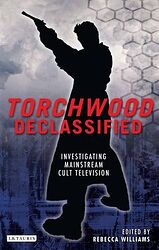 | Edition: | UK (paperback) | | | Released: | September 2013
| | | Publisher: | I.B. Tauris | | | ISBN: | 978-1-78076-178-7 | | | Format: | paperback | | | Owned: | | | | Buy: |  |  | | New: | £17.99 | | Used: | £2.50 |  |
| | Prices as of 9 Jul 10:46 GMT |
  |  | (Unable to fetch price) |
  |  | (Unable to fetch price) |
  |
Cover blurb:
Torchwood started its life on television as a spin-off from Doctor Who, bringing Captain Jack to join new colleagues in a television series that quickly established itself as fresh and watchable television. Its fourth series, subtitled ‘Miracle Day’, also moved from the niche channel of BBC3 to metamorphose into an international production between the BBC and the US network Starz. Torchwood has continued to entertain, provoke and attract large audiences and an expanding fandom. This is the first critical celebration of Torchwood across its four series, considering issues of representation, as well as the fandom that surrounds the show and its complex institutional contexts. Focusing in particular on how the meanings and understandings of cult television have shifted and become subject to technological, industry and marketing changes in recent years, Torchwood Declassified explores topics including the show’s aesthetics and branding, its use of tropes from the horror genre, vast tie-in merchandise, status as a spin-off, the nature of a celebrity that is both cult and mainstream, as well as the use of sound and music and cult writers, and Torchwood’s connection to place and location. The book will appeal to fans of the series, researchers and scholars, and anyone interested in ongoing questions over what cult television is, what it means, and why it continues to be of importance. Rebecca Williams is Lecturer in Communication, Cultural and Media Studies at the University of South Wales. She has written on contemporary cult television series in the collections Reading Angel (I.B.Tauris, 2005) British Science Fiction Film and Television: Critical Essays, and has published in journals including Critical Studies in Television, Popular Communication, Continuum, Television and New Media and Media History. |



